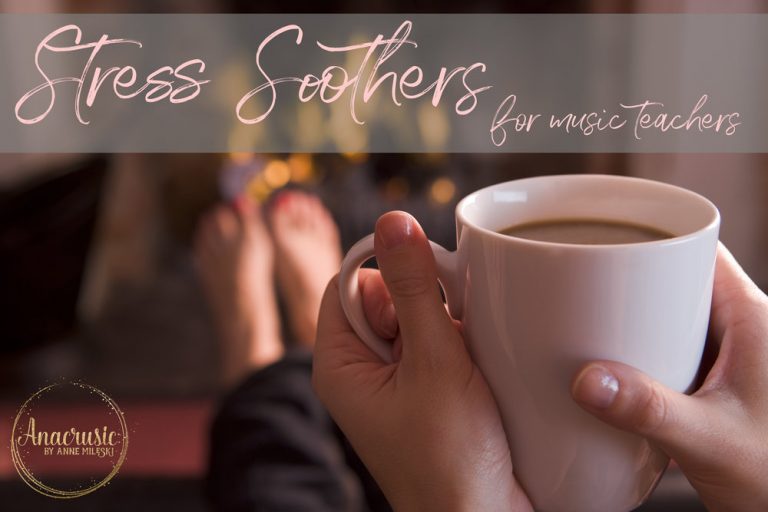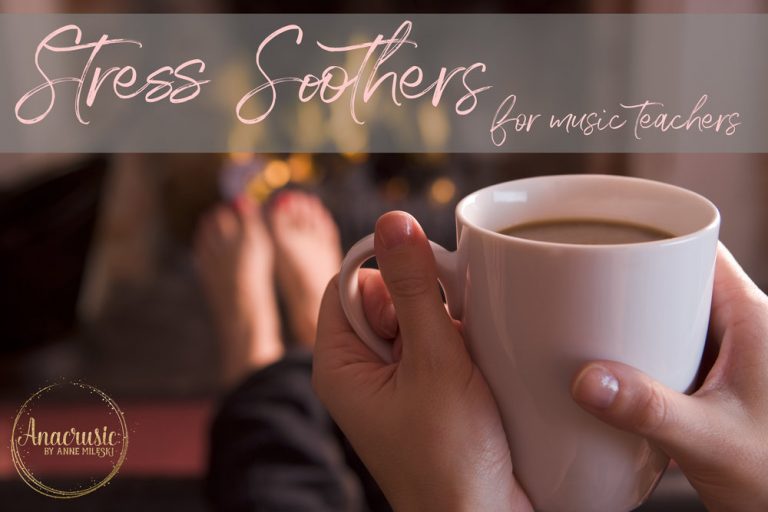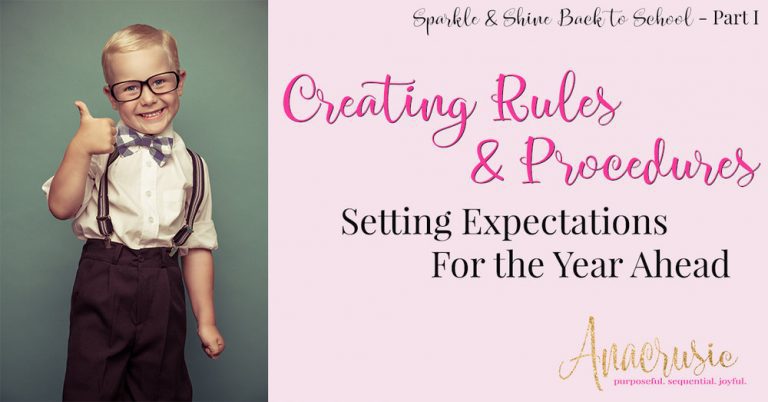Psst!! Did you miss the beginning of the series? Click here for Part I, Part 2, & Part 3.
Welcome to the final installment of the Stress Soothers Series!!
Every Tuesday during the month of March, I’ve been bringing you all the goods to re-energize your teaching and get out of the infamous spring slump. Today is all about professional development and how to beat music teacher isolation. Let’s rock and roll!
Part 4 – Professional Development & Community
So often, music teachers are a party of one, or maybe one and a half, at a campus. Our classrooms are at the end of the hall, isolated from the rest of the school community, and we can easily feel as though we live on our own island, both physically and figuratively. While there usually isn’t a whole lot to be done about where your classroom is located, there are a few things you can do to (1) improve your own teaching within your specialty; and (2) ensure you are a part of the greater school community.
(sidenote: if you haven’t taken a look at last week’s post, it’ll give you a couple tips for being a real team player at your campus, and how to give and earn respect with your non-music colleagues.)
#1 – Make Campus PD & Goals Relevant to your Classroom.
We’ve all sat in on staff meetings or trainings that seem like a complete. waste. of. time. If it doesn’t apply directly to our subject areas, music teachers have a tendency to zone out, check out, or whichever mode of ignoring the presentation you choose to engage. While I think most of our non-music colleagues would agree that there is no reason for us to be there, what would happen if we flipped the script?
What would our colleagues think if we found ways to make that meeting relevant to our classroom? What if we could find innovative ways to adapt the campus goals to our classroom, even if they seem so outrageously different from what we teach day in and day out?
I can think of one particular example when I did just that. In the spirit of incredibly high stakes testing, made even higher by the fact that my current campus was under AYP (Academic Yearly Progress) observation, my administrator at the time required each classroom teacher to incorporate the math term of the week into their lessons. It didn’t matter whether you were the reading specialist, the art specialist, the physical education coach, or the music teacher, we were all expected to have an observable portion of our lesson relate to the math terminology into our weekly lessons.
Since I’ve always been fairly intentional about having an opening sequence for each class, I decided the most natural way to incorporate these seemingly pesky math terms was to add it into that routine, alongside my learning target for the day. Although, once I started brainstorming how to make it all relevant to music I realized that I could easily (1) push my own music teacher agenda while incorporating a campus goal; and (2) create a bulletin board display (check it out for FREE here) that would make my administration do a complete happy dance.
Once I got over my “that doesn’t apply to me” attitude, I found ways to make everyone happy. Including the kids, who were amazed that music applied to other subjects in school. Total score.
So the next time you have to “sit in” on a meeting that is all about ELA or Math, I challenge you to get rid of the “this doesn’t apply to me” attitude and challenge yourself to think, how could this apply to me? Then prepare to see your colleagues and administration overjoyed with your initiative. As an added bonus, you automatically will be seen as a team player because you turned all that negative energy into a collaborative opportunity.
#2 – Seek out PD Relevant to Music Teaching & Learning.
Early on in my teaching, I noticed that teachers on my campus were given many opportunities for professional development, either (1) in our on campus trainings, or (2) off campus and with coverage during the school day. As a music teacher, and being an island of one, this is not always the case—at least not from the get go.
Many of the schools I have worked with have offered, at the bare minimum, a built-in time to collaborate with other music teachers in the district, either on on-going basis or scheduled a handful of times a year. Although this never seems to be enough, I recognize that there are many different pathways to music teaching and learning, and although our curricular goals are generally aligned as a district, our teaching styles are not identical.
I am so grateful, that as an elementary music educator, there are usually several opportunities for professional development throughout the year, whether it be local workshops or national conferences. In particular, I have found that my local Orff & Kodály chapters have provided some of the most meaningful professional development, in addition to the national conferences and summer courses (which can sometimes be a challenge to attend). But let me just tell you…
Summer courses are the jam.
It can be really difficult to give up a week in the summer, let alone three or more, to go through levels trainings in any one pedagogical approach. But if you have the opportunity, these experiences are transformative and completely re-energizing. Summer courses have changed my teaching. (If you want to see which I’ve done, click on over to the About page.)
Granted, these types of opportunities are expensive and time-consuming. I recommend that you gently ask your administration what opportunities might be available to you as a music specialist who does not always get content specific training at the campus or district level. Honestly, I’ve never had all expenses paid for any of these workshops, conferences, or courses, but I have found that when I show the initiative and highlight that my own time and money are going into this professional development to better my teaching and our students’ learning experience, there has been something available to me. Why not ask? The worst they can say is no, and then you’re no further behind than you were when you started.
#3 – Take Every Opportunity to Collaborate
If you do have the great opportunity to take part in a summer course, a workshop, or even a national conference where there are a ton of your people, make sure you step out of your comfort zone and make some music teacher friends! Although we are all probably secretly introverted (and acting our little hearts out in front of our kids each and every day), it is so important to make connections when the opportunity arises.
People I have met through my levels courses are still some of the most important people in my life, professionally and personally. A random folk dance partner at a workshop or conference can lead to lunch and a great conversation about music teaching and life in general, and grow into an amazing collaboration. Don’t let moments pass you by—the universe sets you up for all of these amazing opportunities.
There’s nothing that replaces live, in person opportunities to collaborate and take part in life-long learning. But I do understand that it is difficult, expensive, and time-intensive (and sometimes just impossible!) to attend face to face events. Lucky for us, we live in the digital age and have a whole world of music teachers at our fingertips.
I’ve found that Facebook groups are amazing resources for questions, brainstorming, and just getting a general feel for what is going on in the music ed world. Here are a few of my favorites:
- I’m a General Music Teacher
- Elementary Music Teachers
- American Orff-Schulwerk Association
- Kodály Educators
- Kodály Educators Resources
- Organization of American Kodály Educators
Going along with that, I often check out different hashtags on Twitter to see what other music teachers are doing in their classrooms and what questions they are sharing to the twitterverse (is that a term? Did I make it up?). Some of my favorites are #elmused #musedchat #kodaly #orffposse. (#elmused & #musedchat even have weekly twitter chats!! Check them out!!)
Instagram hashtags are another great way to search for beautiful visuals and connect with music teachers. Melody Payne wrote an awesome blog post about music teacher hashtags. A great place to start is with #iteachmusic and #musicteacherlife.
There’s probably a million other resources out there that I’m not even thinking of, but these are great places to start.
With a little bit of effort, we can find ways to beat music teacher isolation and seek out resources and opportunities for collaboration with our peers. Don’t forget, I’m always here to answer your questions and brainstorm with you as well! Follow me on Facebook, check me out on Instagram, and take a peek at my Twitter feed and obsessive pinning about… everything. It’s not just about finding other music teachers who can help us in the classroom, but having like-minded folks on our team that we can build a solid, life-long relationship.
Welp, that’s it for the Stress Soothers Series!! What did you think? What do you want more of? Don’t forget to let me know, and don’t forget to subscribe so you don’t miss out on any other tips or the Free Resource Library! The math posters I referenced in this post were just added!!






